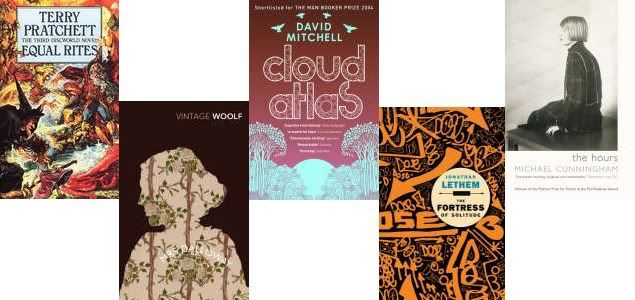 In January 2009, I was introduced to the wonderful world of David Mitchell by a friend, who lent me the surreal number9dream - a book I absolutely loved. She proceeded to lend me Cloud Atlas next, and it's been sitting abandoned on my unread shelf for about a year now, as I've been reluctant to pick it up for a myriad of reasons - book bloggers everywhere rave about it calling it a favourite, it's considerably chunky at 529 pages, and, well, it's Mitchell's most acclaimed book yet.
Anyhow, I finally picked it up about a week back, and rode the long roller-coaster that is this book - it's a heck of a ride, you're almost begging for it to finish (as, all said and done, it is a difficult book to read), but when you eventually do turn the last page, you want to experience it all over again.
In January 2009, I was introduced to the wonderful world of David Mitchell by a friend, who lent me the surreal number9dream - a book I absolutely loved. She proceeded to lend me Cloud Atlas next, and it's been sitting abandoned on my unread shelf for about a year now, as I've been reluctant to pick it up for a myriad of reasons - book bloggers everywhere rave about it calling it a favourite, it's considerably chunky at 529 pages, and, well, it's Mitchell's most acclaimed book yet.
Anyhow, I finally picked it up about a week back, and rode the long roller-coaster that is this book - it's a heck of a ride, you're almost begging for it to finish (as, all said and done, it is a difficult book to read), but when you eventually do turn the last page, you want to experience it all over again.
The book comprises of six independent stories, that span centuries and the atlas, of which five are told in "halves," revolving around the central tale of the post-apocalyptic future, where humans are living as savages, after The Fall. In the first set of "halves", which goes chronologically, each story is read/seen by a character in the subsequent one. In the second set, the stories start moving backwards, so the characters end up reading/seeing the story that follows. Hence, the opening chapter of the book (the first incomplete half-story) is completed in the last chapter.
The common theme that runs through the book is the presence of a "comet-shaped birthmark" - a distinction present in the protagonist of each story. Does this suggest reincarnation? The existence of the soul across generations? Or, is that merely coincidental?
Souls cross ages like clouds cross skies, an’ tho’ a cloud’s shape nor hue nor size don’t stay the same it’s still a cloud an’ so is a soul. Who can say where the cloud's blowed from or who the soul'll be 'morrow?
The Pacific Journals of Adam Ewing {1850s} : A journal written by an American notary in the Pacific, who befriends an English surgeon as well as a stowaway Moriori. This story is cut off mid-sentence (and comes together nicely as the last chapter)...
Letters from Zedleghem {1931} : A young aspiring bankrupt composer, Robert Frobisher, goes to Belgium to apprentice with a famous composer, hoping to make some easy money, and simultaneously finding some success. Here, he discovers The Pacific Journals in the library...
Not only are there some romantic (and otherwise) twists in the tale, but, as Frobisher details his life in the Belgian estate to an old friend, Sixsmith (in the form of letters), the reader is introduced to Frobisher's biggest work, revolutionary or gimmicky: The Cloud Atlas Sextet.
Half Lives : The First Luisa Rey Mystery {1970s} : We move across the pond for this one, where Luisa Rey is a journalist, and is focusing on a big expose on the Swannekke Island Nuclear Plant in California. Sixsmith is the scientist who gave her the lead for the story, and in time, she reads the letters written to him by Frobisher. Luisa, trying to follow in her father's footsteps, seems to be hellbent on justice (consequentialism), even if it is at the expense of her own life.
The Ghastly Ordeal of Timothy Cavendish {present-day} : The focus shifts to present-day United Kingdom, where Timothy Cavendish is a struggling not-so-moral publisher, but, when he is tricked into admitting himself in an old-age home, with no way out, he starts trying to figure out the best way to escape, which leads to more trouble for him. A manuscript of The First Luisa Rey Mystery was sent to him by an author, and he's contemplating publishing it...
An Orison of Somni 451 {near future} : In this dystopia, where fabricants are slaves to purebloods, Somni 451 has ascended, and managed to develop her own personality, by acquiring immense knowledge. It's a story about the struggle of powers, the violence that emerges and the unfortunate state of things as they stand. She's not a partaker though, merely an observer, who recites her life-story to an Archivist. She was watching the film of Timothy Cavendish, when she was taken away...
Sloosha’s Crossin’ an’ Ev’rythin’ After {Post-apocalyptic future} : Zach'ry is the protagonist here, in a civilisation that considers Somni god, and Ol' Georgie the devil. Zach'ry and his family are savages, in awe of the Smarts, believing that the Soul either reincarnates or gets set to stone. Technology is a myth in this civilisation, and, the people mainly herd goats or the like, living in tribes in forests, fearing invasion and power struggles by the terrifying Kona.
This book is immense - the writing style in each of the stories changes significantly, so much so that they read as completely different stories : from Victorian formal english, peppered with ampersands and other shorthands, to pidgin english which I personally found quite annoying to read. However, each style seems to reflect the age it it set in, appropriately, as well as, the structure of each story seems to be similar to its genre. For example, the Luisa Rey mystery is written in numerous short chapters, much like an airport thriller, whereas, the post-apocalyptic narration is written as a rather long rant.
The common theme that binds these stories together soars above and beyond the comet-shaped birthmark. It's a story about power, domination, and the ultimate quest to rule. The stories stress on the selfishness of people, and how ultimately, this will lead to the inevitable apocalypse.
Yes, the devil shall take the hindmost until the foremost is the hindmost. In an individual, selfishness uglifies the soul; for the human species, selfishness is extinction.
While I enjoyed this book, parts of the stories just didn't grab me, and I was left quite unsure as to what's going on, and how these stories are inter-linked together. Why isn't it just a book of short stories? A much less author might have done that... or, attempted six different novels, with completely different themes. However, Mitchell, managed to tie most of the loose ends together, and left me questioning my own existence, and the power of one individual. It's an ambitious work, but, in my opinion, Mitchell's managed to pull it off surprisingly well.
 So, Sarah managed to convince me to join in the Roberto Bolaño 2666 readalong. I was a little sceptical at first, having just finished Cloud Atlas, and wanting to do some lighter reading. However, the temptation of reading 2666 along with a bunch of other people was too strong to resist. Plus, the readalong seems to be relatively easy - just fifty pages a week. Essentially, bedtime reading every Sunday!
So, I've read the first fifty pages (fifty one, if you want to be pedantic), and I'm cruising along. The writing is beautiful, but surprisingly easy to get on with, and the characters already seem interesting. Four scholars, from different countries, with one common interest: an author called Archimboldi. The author is a mysterious persona; no one knows his whereabouts - it's like he's vanished from the face of the earth.
So, Sarah managed to convince me to join in the Roberto Bolaño 2666 readalong. I was a little sceptical at first, having just finished Cloud Atlas, and wanting to do some lighter reading. However, the temptation of reading 2666 along with a bunch of other people was too strong to resist. Plus, the readalong seems to be relatively easy - just fifty pages a week. Essentially, bedtime reading every Sunday!
So, I've read the first fifty pages (fifty one, if you want to be pedantic), and I'm cruising along. The writing is beautiful, but surprisingly easy to get on with, and the characters already seem interesting. Four scholars, from different countries, with one common interest: an author called Archimboldi. The author is a mysterious persona; no one knows his whereabouts - it's like he's vanished from the face of the earth. It's not often a book leaves me completely speechless. Wowed. Awestruck. Absolutely blown away. But then again, it's not often that I come across a book like Michael Cunningham's The Hours. Both,
It's not often a book leaves me completely speechless. Wowed. Awestruck. Absolutely blown away. But then again, it's not often that I come across a book like Michael Cunningham's The Hours. Both, 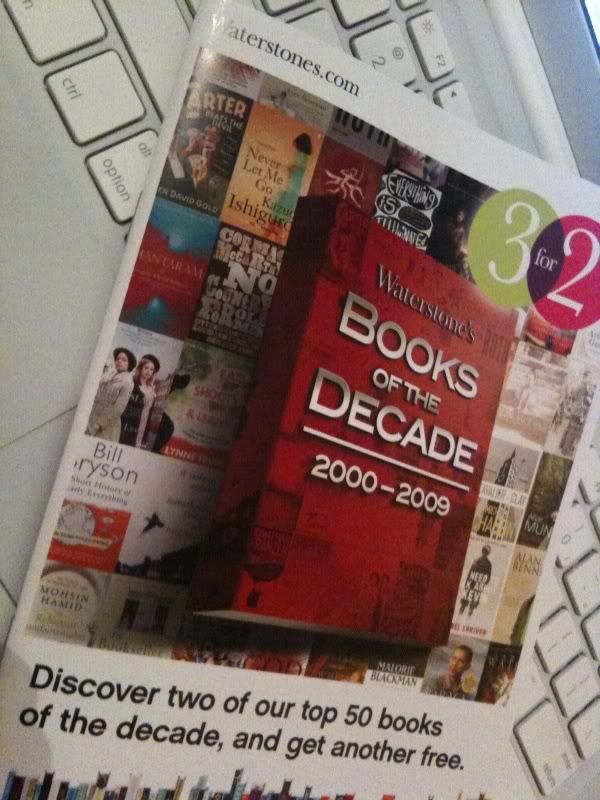
 In January 2009, I was introduced to the wonderful world of David Mitchell by a friend, who lent me the surreal
In January 2009, I was introduced to the wonderful world of David Mitchell by a friend, who lent me the surreal 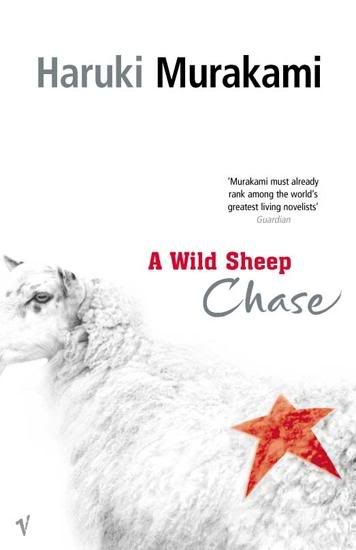 The amazing thing about Murakami's books is, you never know what you're going to get - when that bridge between reality and surrealism will get crossed, and, what avenues the surrealism will take. Past experiences with Murakami have also taught me that the story is not going to be like anything I've read before. Experience is a great teacher.
A Wild Sheep Chase, originally published in the early 1980s, is literally the story about a young man (who is a partner at an ad agency and PR firm) and his girlfriend's (a girl with the most sensual ears) quest to find a sheep - not just any sheep, but a sheep with a star on its back; a sheep that, by all rights, shouldn't exist in Japan, where all sheep breeds have always been monitored and documented closely. You could say that their search is a metaphorical wild goose chase, but....
The amazing thing about Murakami's books is, you never know what you're going to get - when that bridge between reality and surrealism will get crossed, and, what avenues the surrealism will take. Past experiences with Murakami have also taught me that the story is not going to be like anything I've read before. Experience is a great teacher.
A Wild Sheep Chase, originally published in the early 1980s, is literally the story about a young man (who is a partner at an ad agency and PR firm) and his girlfriend's (a girl with the most sensual ears) quest to find a sheep - not just any sheep, but a sheep with a star on its back; a sheep that, by all rights, shouldn't exist in Japan, where all sheep breeds have always been monitored and documented closely. You could say that their search is a metaphorical wild goose chase, but....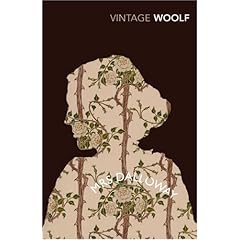 Claire {@
Claire {@  Harry Potter and the Order of the Phoenix is the fifth book in the popular Harry Potter series. I've read the book thrice: when it first came out, before the release of Harry Potter and the Half Blood Price, and of course, prior to the final book, Harry Potter and the Deathly Hallows, hitting the stores. One of my friends insisted I hadn't lived until I heard the Harry Potter audio books, and she proceeded to lend me six of the seven.
Harry Potter and the Order of the Phoenix is the fifth book in the popular Harry Potter series. I've read the book thrice: when it first came out, before the release of Harry Potter and the Half Blood Price, and of course, prior to the final book, Harry Potter and the Deathly Hallows, hitting the stores. One of my friends insisted I hadn't lived until I heard the Harry Potter audio books, and she proceeded to lend me six of the seven.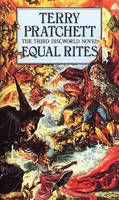 Terry Pratchett's Equal Rites is the third book of the Discworld series, and, it's the first Discworld book that I have read.
Equal Rites explores the world where women cannot be wizards, and men cannot be witches. However, when a dying wizard visits a blacksmith, things in the wizarding world are about to change. The blacksmith is the eighth son, and his wife is about to give birth to their eighth son - perfect for the dying wizard to pass on his staff. Granny Weatherwax, a central character, who helps bring the baby into world, takes the baby to the smith, who makes it grab the staff. The old wizard dies, but, what the smith failed to realise is, the newborn baby blessed with magical wizard powers is a girl!
Terry Pratchett's Equal Rites is the third book of the Discworld series, and, it's the first Discworld book that I have read.
Equal Rites explores the world where women cannot be wizards, and men cannot be witches. However, when a dying wizard visits a blacksmith, things in the wizarding world are about to change. The blacksmith is the eighth son, and his wife is about to give birth to their eighth son - perfect for the dying wizard to pass on his staff. Granny Weatherwax, a central character, who helps bring the baby into world, takes the baby to the smith, who makes it grab the staff. The old wizard dies, but, what the smith failed to realise is, the newborn baby blessed with magical wizard powers is a girl! I finished this book over two weeks ago, and have been struggling to write the review ever since. I honestly hoped I wouldn't have to drag it into the new year, but there you have it...
This is the first Toni Morrison I've read, and I started the book with great trepidation. I've heard phenomenal things about Toni Morrison, and I was intimidated... unsure of what to expect. I really hoped I'd enjoy the book, and it would make me go out and buy more books by Morrison instantaneously, but unfortunately, I was left feeling fairly indifferent. I didn't like the book. I didn't dislike the book... and I'm not accustomed to having that kind of a reaction to a book - especially as I've mulled over it for about two weeks!
I finished this book over two weeks ago, and have been struggling to write the review ever since. I honestly hoped I wouldn't have to drag it into the new year, but there you have it...
This is the first Toni Morrison I've read, and I started the book with great trepidation. I've heard phenomenal things about Toni Morrison, and I was intimidated... unsure of what to expect. I really hoped I'd enjoy the book, and it would make me go out and buy more books by Morrison instantaneously, but unfortunately, I was left feeling fairly indifferent. I didn't like the book. I didn't dislike the book... and I'm not accustomed to having that kind of a reaction to a book - especially as I've mulled over it for about two weeks!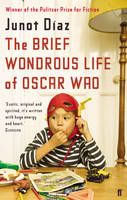 The Brief Wondrous Life Of Oscar Wao won the Pultizer Prize for Fiction in 2008. The protagonist, Oscar, is an overweight American boy (with Dominican roots), who aspires to be the next Tolkien. His interests include writing passionately, role-playing games, comic books, sci-fi and fantasy, and of course, women. However, one bad experience with his first love meant his adolescent nerdliness vaporising any iota of a chance he had for young love. He lives in New Jersey with his demanding difficult-to-please mother, Belicia, and his rebellious punk sister, Lola.
While the protagonist of this book is Oscar, it's narrated by Yunior - Oscar's roommate from college, as well as a love interest of Lola. Also, this is not a book about "the brief wondrous life of Oscar Wao" - instead, it's an epic story of the curse (fukú) that Oscar's family has been subject to, for the past two generations, in the hands of Trujillo, a dictator in the Dominican Republic in the mid-1900s.
The Brief Wondrous Life Of Oscar Wao won the Pultizer Prize for Fiction in 2008. The protagonist, Oscar, is an overweight American boy (with Dominican roots), who aspires to be the next Tolkien. His interests include writing passionately, role-playing games, comic books, sci-fi and fantasy, and of course, women. However, one bad experience with his first love meant his adolescent nerdliness vaporising any iota of a chance he had for young love. He lives in New Jersey with his demanding difficult-to-please mother, Belicia, and his rebellious punk sister, Lola.
While the protagonist of this book is Oscar, it's narrated by Yunior - Oscar's roommate from college, as well as a love interest of Lola. Also, this is not a book about "the brief wondrous life of Oscar Wao" - instead, it's an epic story of the curse (fukú) that Oscar's family has been subject to, for the past two generations, in the hands of Trujillo, a dictator in the Dominican Republic in the mid-1900s. Happy New Year, everyone. Have a fantastic year ahead, where wishes come true, and disappointments are a thing of the past! Considering my year has started with me realising my beloved laptop (which has been the only constant in my life for the past three years) is on the verge of dying, I'm getting a little ambivalent about the new year already! Oh well... I won't dwell on that.
Happy New Year, everyone. Have a fantastic year ahead, where wishes come true, and disappointments are a thing of the past! Considering my year has started with me realising my beloved laptop (which has been the only constant in my life for the past three years) is on the verge of dying, I'm getting a little ambivalent about the new year already! Oh well... I won't dwell on that.